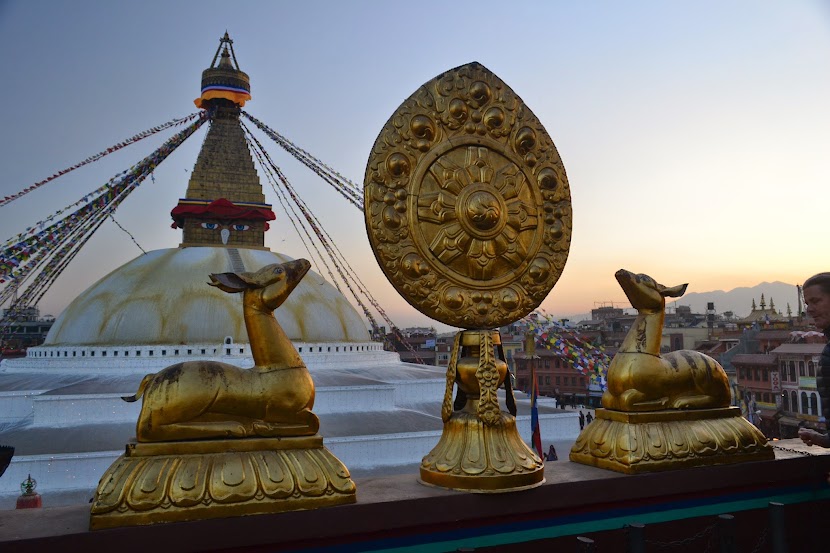Visa & empire of indifference
By ABHI SUBEDI
The old Rana Lal Durbar in the heart of Kathmandu without the vibrant Yak & Yeti Hotel wore the look of a deserted palace that morning of 27 July 2006 also. Like many Asian baroques it was neither a museum nor a vibrant house. It was languishing in a twilight zone between the two. Two wings in the north-western side of the palace that house casino and the American consular office, however, looked vibrant. I stood in a long queue of young people waiting to be hauled up to the second floor. Standing in queue with my host's financial affidavit signed by his solicitor, letter of invitation, air ticket details and academic documents to apply for a week's visa to attend American writers' programme in New York, I became conspicuous among the young people. Felt a certain gloom suddenly when I saw these talented youths merge into a pattern and become a stream that was flowing into the unknown.
They must have been 10 years old when the state-Maoist war began in this country. They grew with the news of deaths, bombs, kidnappings, disappearances and images of child soldiers slain by the army and paraded on green turfs to please their supreme commander-in-chief. The Maoists committed a crime by recruiting the child soldiers and the army committed crimes by slaying them indiscriminately. But the other youths worked day and night through these difficult years and graduated from schools and 10+2 colleges. Their parents watched them like sentries until such times when they would be ready to flee the turbulent 'motherland'!
As a close observer of the hippie movement, I felt that this mini-exodus of Nepali youths looked like the reversal of the historical journeys of the American youths in the late sixties and early seventies who came to Nepal to escape the Vietnam War, compulsory military service and the imperial indifference to their aspirations. As I was looking at the sea of these youths' faces with some unease, a friendly guard called us upstairs. Many more youths were waiting there for their turns in the interviews with the consuls who looked distant and were speaking in official styles behind six windows. We were the most senior people for some time until other senior people came into the room.
I heard these youths explain in very clear English before the consuls what they wanted to achieve. I heard the cries of agony in the discourse of some when their statements turned into plea. The consuls who meet 500 such people each day naturally do not see that human side. Those who interview many naturally look like the indifferent Church priests who listen to people's secret confessions. Physically challenged people, refugees and the EDV-wallas go in the afternoon, they told me.
Ironically, Nepalis have made the six American consuls who listen every day to the pleas, agonies and aspirations of every sector of this society the screens on which they see the cinema of their own Nepali turbulent history and their dreams. Each one pays heavy fees to see the cinema. Naturally, most are advised to try again.
It is said that the Nepali youths are given visa out of kindness. That is untrue. The country's weak economy is used to exoticise the otherness of the Nepalis. In reality, America needs the Nepali youths more because the Americans know that these Nepali youths have no metaphysical agenda, no plans to rock and terrorise the Americans, and no plans to get training on American soil to start star wars there. As all the records show, they are honest and very intelligent.
A woman behind the window asked me "will you return? You seem to have visited so many places. How come? Are you retired?" I started wondering if she had read any of my papers. She said to me as she has been saying to these brilliant but tense students—"try again". I said, "No, I don't have time". Like the protagonist in BP Koirala's story Shatru in whose room does a stick drop from nowhere making him guess who could be his enemy, I too began to wonder why American visa was denied to me. Was it because of my democratic disagreements with the American Ambassador's interpretation of Nepali politics or America's call to the Nepali parties to accept King Gyanendra's first misleading offer in my earlier essays? But I knew as if in a flash, it was none of these. Who would bother to read my essays and say, "Oh, so you are a professor, a writer, one of the important promoters of American studies? Good! Come this way, please!"
The reality is that no country can give visa to every applicant. Moreover, home country's political system is also responsible for the spontaneous exodus like the hippies or the Nepali youths. But America consciously exercises the luxury of the grand indifference syndrome, because according to Michael Ignatieff, this empire exercises 'hegemony without colonies'. This borderless empire rules the tides of migration, and 'try again' is the mantra of that indifference syndrome.
I walked out of the old Rana house wiser and unburdened.

No comments:
Post a Comment